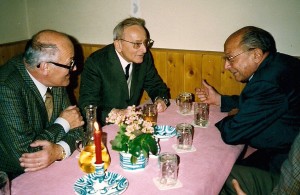Josef Steindl grew up in Vienna under moderate circumstances. His father, Rudolf Steindl, was a clerk at the Austrian State Printing Office. His mother, Leopoldine Steindl, was a sister of Koloman Moser, the famous Austrian Art Nouveau artist who had considerable influence on 20th-century graphic art.
He studied Economics at the Hochschule für Welthandel (today’s University of Economics and Business) at the time of the Great Depression. The misery of these years of burdensome unemployment and poverty arouse his lasting sensitive social conscience.
In 1935, Josef Steindl graduated and began his career as an economist at the Austrian Institute of Business Cycle Research (Institut für Konjunkturforschung). This institute had been founded by Ludwig von Mises and Friedrich von Hayek, its first director, in 1927 and was characterized by a stimulating atmosphere with lively contacts abroad. Thus, soon after the publication of the General Theory Josef Steindl became acquainted with the new Keynesian thinking in one of the regular seminars at the institute.
In 1938, when NAZI-Germany occupied Austria he lost his job and managed to migrate to England. With the help of Nikolas Kaldor and his former colleagues who had left before (Mises, Haberler, Hayek, and Rosenstein-Rodan) he got a research lectureship at the Balliol College in Oxford.
Two years later, he moved on to the Oxford Institute of Statistics where he worked next to Michal Kalecki and a period began which he named his “formative years”, and led him to the statement: “As an economist I am the product of England and Kalecki.”
In 1950, Josef Steindl returned to Austria and to his job in Vienna at the institute – now reopened as the Austrian Institute of Economic Research, WIFO. In spite of the empirical orientation of the Institute and a vast output of empirical studies on the Austrian economy he managed to find a niche for theoretical studies – thanks to financial support by the Rockefeller Foundation.
Austrian academia initially ignored Josef Steindl. When he submitted Maturity and Stagnation (1952) as professorial dissertation (Habilitationsschrift) it took his colleagues a full year to decide not to accept it because it was written in English. It was only in 1970, when a new generation took over, that the University of Vienna conferred an honorary professorship on Josef Steindl, and in 1985 the University of Graz followed with an honorary doctorate.

In 1978, Josef Steindl retired after he had spent about thirty years of his life at the Institute, but stayed on as a consultant whose advice was both much appreciated and stimulating.

He died on March 7th, 1993 at his home in Vienna.
Literature:
“Josef Steindl: 1912 – 1993”
Kurt W. Rothschild
The Economic Journal, Vol.104 (422), January 1994, p. 131-137. Link
“Josef Steindl“
Nina Shapiro
In: Philip Arestis and Malcolm Sawyer (Eds.): A Biographical Dictionary of Dissenting Economists, Edward Elgar, Aldershot, Hunts, 1992, p. 549-555. Link
“Steindl, Josef (1912-1993)“
Kazimierz Laski
In: Steven N. Durlauf and Lawrance E. Blume (Eds). The New Palgrave Dictionary of Economics. Second Edition, 2008. Link
“Josef Steindl’s Life and Work in Austria”
Alois Guger and Ewald Walterskirchen
PSL Quarterly Review, Economia civile, vol. 65(261), pages 135-149. Link